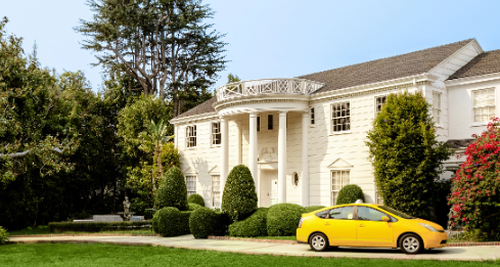LA Turns To A "Mansion Tax" To Try And Solve Its Homelessness Problem
Believe it or not, California thinks it has a solution to the homelessness problem that can be solved with additional taxation! Go figure.
A new measure in Los Angeles, called Measure ULA, is set to generate $900 million in taxes that will then be used for housing subsidies and tenant protections. The tax is essentially a levy on all property sales of more than $5 million, according to Bloomberg.
This "mansion tax", if it passes, will look to "speed new construction and deliver a way out of the city’s spiraling homelessness crisis", according to Bloomberg. It could generate some $900 million per year to provide infrastructure like affordable homes and tools like counsel for tenants in eviction courts.
Laura Raymond, director of the nonprofit Alliance for Community Transit–Los Angeles, told Bloomberg: “This would be the biggest investment in tenant protections in the history of LA."
Yes, and it would be another reason on a long list of reasons for Californians to continue their exodus from the state to greener tax pastures like Florida and Texas.
She continued: "“We want to make sure that once this has passed, the housing experts, community organizations, community leaders and people who’ve been doing this work for many years are at the forefront of implementation."
Meanwhile critics of the bill say it could ultimately wind up causing costs for developers and, subsequently rents, to rise. The city had tried to issue a bond in 2016 to provide the same type of relief, but that measure was "lackluster" in its success, the report says.
Bloomberg explains the new tax:
The current .45% transfer tax for all properties would jump to 4% for sales of more than $5 million, while transactions that top $10 million would garner a tax of 5.5%. It’s a special tax, meaning revenues don’t go into the city’s general fund but rather a dedicated purse. There’s a set-aside of 8% of revenues for an inspector general and oversight staff; the rest goes toward housing. The split for these funds is 70% for affordable housing (construction, subsidies and preservation) and 30% for homelessness prevention (various measures and tenant protections).
“We’re talking about very, very high-wealth individuals, but even more so large real estate corporations that honestly have not been paying their fair share, and have been making a killing off of this housing market as it is now," Raymond continued.
Affordable housing builders would be obvious beneficiaries from the tax, which will generate $600 million to $1.1 billion per year, bolstering subsidies for such developments.
Critics of the bill state the obvious: that it will disincentivize developers from building in Los Angeles. But "researchers" at UCLA are skeptical about the disincentives.
Shane Phillips, housing initiative project manager for the UCLA Lewis Center for Regional Policy Studies and co-author on a series of studies focused on Measure ULA and transfer taxes, offered up his best "modern monetary theory"-style explanation, telling Bloomberg: “That money has to come from somewhere. It’s not going to come from the buyer or renter. So the place it’s going to come from is the owner of the land from whom the developer buys the property.”
Raymond concluded: “In the past, we’ve had politicians get behind one solution. Right now we see criminalization of homelessness as being a major focus. That’s where they’ve poured a lot of their energy over the last couple of years, sweeping the streets. This is very different from that type of approach.”
You can read more about the details of the tax here.

Comments
Post a Comment